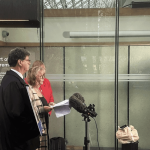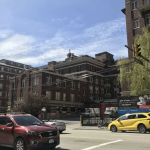In a blend of faith and environmental activism, World Youth Day pilgrims from Vancouver gifted rosaries crafted from recycled ocean plastic to other travellers in Lisbon, Portugal, to spotlight the dual themes of religious devotion and ecological stewardship.
100 rosaries were distributed by pilgrims from various Vancouver Catholic parishes, including Christ the Redeemer Parish in West Vancouver, St. Matthew’s Parish in Surrey, and Corpus Christi Parish in Vancouver.
The rosaries have the ancient Christian symbol for Christ, the anchor, in place of the crucifix to connect people to the ocean plastic used in their construction.
Video: St. Matthew’s parishioner Matthew Furtado exchanges a Plastic Bank Rosary for a prayer card with another pilgrim.
The initiative was backed by Plastic Bank, a Vancouver-based social enterprise that has carved a niche for itself by transforming plastic waste into items of value. Its mission is twofold: curbing the flow of plastic into oceans and simultaneously addressing poverty by making plastic a resource too precious to discard.
“The response was overwhelmingly positive,” Peter Nitschke of Community Partnerships at Plastic Bank told CNA Deutsch, CNA’s German-language news partner.

He expressed hope that the unique rosaries would resonate with Pope Francis’ message in Laudato Si’, urging global citizens to care for the planet. “In intertwining faith with environmental consciousness, our aim is to galvanize both pilgrims and the wider public to embrace the social recycling ethos,” Nitschke said.
The inception of the initiative, said Nitschke, was serendipitous.
“Taylor Cannizzaro, our chief relationship officer, was en route to Rome for discussions on potential collaborations between Plastic Bank and the Vatican’s Dicastery for Integral Human Development. A chance encounter with a fellow passenger – a rosary artisan – sparked the innovative idea of crafting rosaries from plastic destined for the oceans.”
The process, as detailed by Nitschke, is community-centric. “Locals collect plastic waste from varied sources, ranging from coastal areas to urban neighbourhoods. This not only aids in environmental cleanup but also economically uplifts these communities.”

He highlighted a commendable effort from Brazil, where a parish succeeded in gathering over 24,000 kilograms (about 53,000 pounds) of plastic in a brief span. “Such endeavours underscore the transformative power of grassroots movements,” Nitschke said.
Once collected, the plastic undergoes a metamorphosis, eventually finding its way into various products, including the rosary beads.
Nitschke also touched upon the societal implications of their initiative. “These rosaries are meticulously crafted by individuals at the Manila City Jail as part of a special program by the Philippine Bureau of Jail Management and Penology. This program offers inmates, termed as People of Deprived Liberties, avenues for skill development and earning opportunities.”
Pope Francis wrote in Laudato Si’: “The growing problem of marine waste and the protection of the open seas represent particular challenges” and emphasized “our duty to care for the oceans as part of an integrated vision of human development.”



